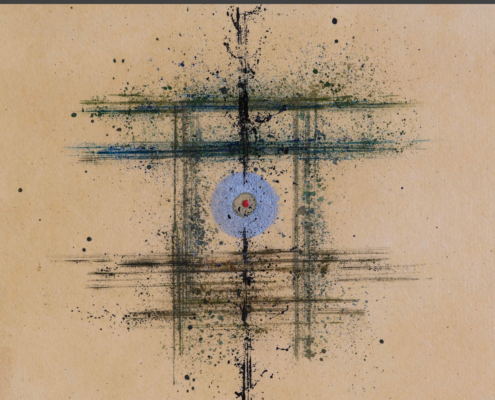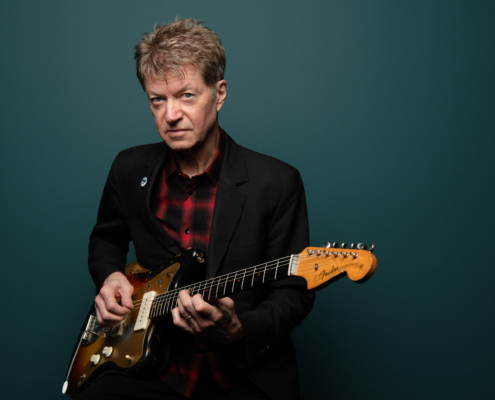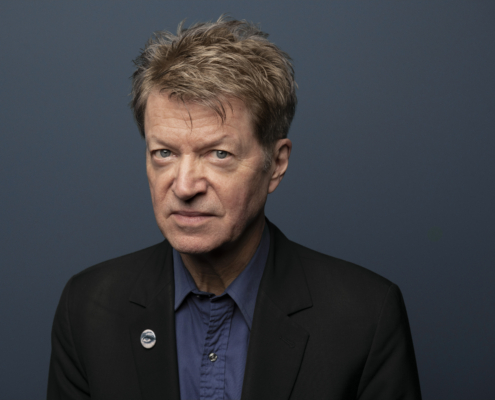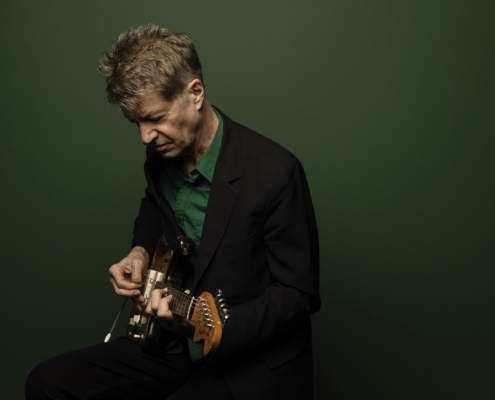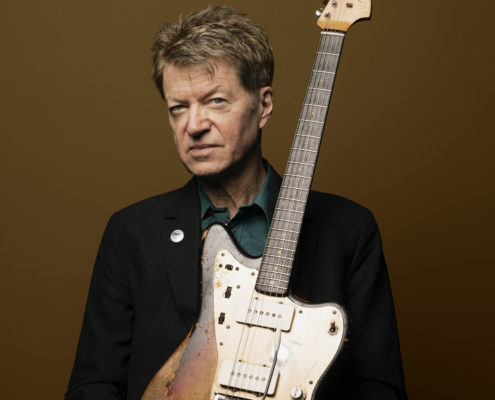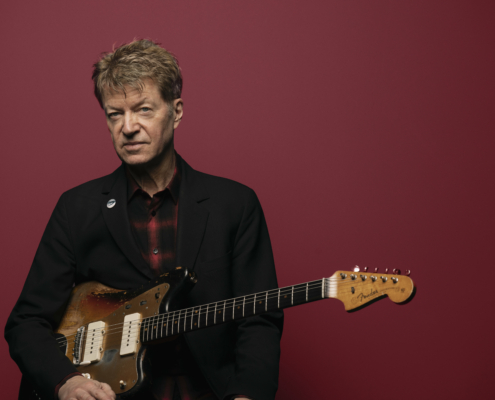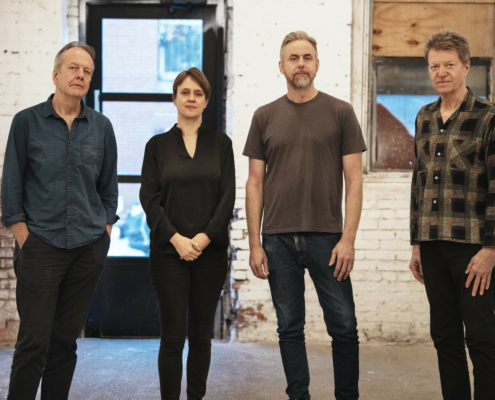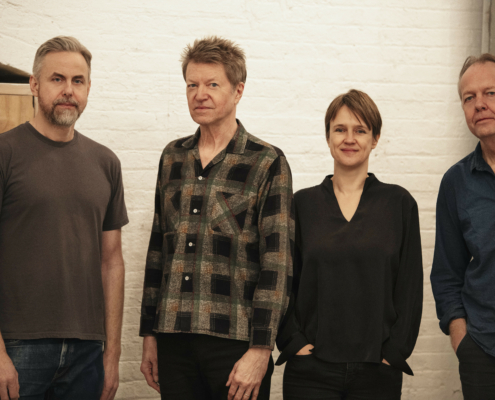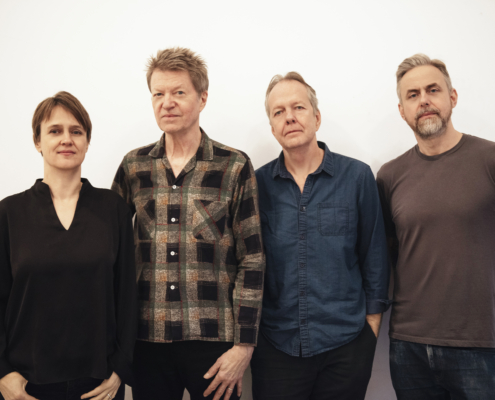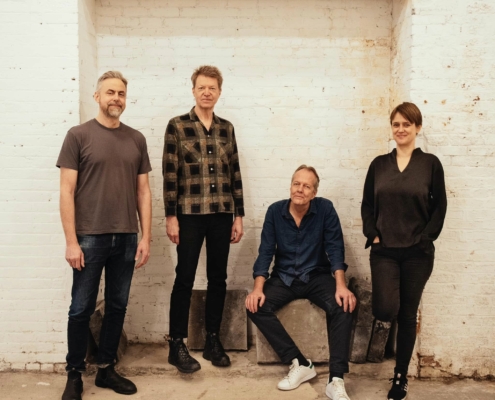Nels Cline – Consentrik Quartet
- The Returning Angel (5:20)
- The 23 (5:15)
- Surplus (5:17)
- Slipping Into Something (5:03)
- Allende (6:11)
- House Of Steam (5:52)
- Inner Wall (5:15)
- Satomi (9:39)
- The Bag (4:59)
- Down Close (4:14)
- Question Marks (The Spot) (5:20)
- Time Of No Sirens (5:18)
All songs by Nels Cline
Nels Cline: electric & acoustic guitars, effects / Ingrid Laubrock: tenor & soprano saxophones
Chris Lightcap: acoustic bass, effects / Tom Rainey: drums
Recorded by Eli Crews on February 13, 14 & July 27, 2024 at The Bunker Studio, Brooklyn NY
Produced by Nels Cline
Nels Cline, Gitarrist der US-Independent-Rockband Wilco, den der Rolling Stone in seiner Liste der “100 Greatest Guitarists of All Time” auf Platz 82 führt, ist in seinem „zweiten Leben“ Jazz-Gitarrist, und das seit 2016 auf dem weltweit renommiertesten Label des Genres: Blue Note Records. Sein viertes in einer Reihe stilistisch unterschiedlicher Blue-Note-Alben hat er jetzt nach seinem neuesten Ensemble Consentrik Quartet benannt, mit Ingrid Laubrock (Saxofone), Chris Lightcap (Bass) & Tom Rainey (Drums), dessen Debütaufnahme dies ist.
Nels Cline stilistisch in eine Schublade stecken zu wollen, gleicht dem Versuch, einen Pudding an die Wand zu nageln. International bekannt wurde der Gitarrist vor rund 45 Jahren zwar mit Aufnahmen an der Seite von Jazz-Avantgardisten wie Tim Berne und Vinny Golia, doch schon bald machte er deutlich, dass er sich nicht nur in dieser Nische aufhalten, sondern seine Fühler in alle erdenklichen musikalischen Richtungen ausstrecken wollte. Heute gilt Cline, der seit 2004 Lead-Gitarrist der Indie-Rockband Wilco ist, als einer der stilistisch vielseitigsten Gitarristen.
Davon zeugen auch seine seit 2016 bei Blue Note erschienenen Soloalben, die jeweils eine andere der vielen musikalischen Facetten von Nels Cline beleuchten. Mal präsentierte er sich als aufgeklärter postmoderner Romantiker mit Bläser- und Streicherverstärkung und experimenteller Mood Music (Album „Lovers“, 2016), dann navigierte er mit dem Quartett The Nels Cline 4 und Julian Lage als Gitarrenpartner durch ein abenteuerliches Terrain zwischen zeitgenössischem Jazz und improvisierter Musik (Album „Currents, Constellations“, 2018) oder zelebrierte mit seinem sängerlosen Indie-Rock-Trio The Nels Cline Singers und Gästen lustvoll die hohe Kunst des Gitarren- und Stilgrenzen-Schredderns (Album „Share The Wealth“, 2020).
Auf „Consentrik Quartet“ stellt Nels Cline nun sein jüngstes, gleichnamiges Quartett mit der aus Deutschland stammenden, aber schon seit langem in New York lebenden Saxofonistin Ingrid Laubrock, dem Bassisten Chris Lightcap und dem Schlagzeuger Tom Rainey vor. Das Album ist eine Art Liebeserklärung an die vielfältige Improvisationsszene Brooklyns, in der der aus Los Angeles stammende Gitarrist seit über zehn Jahren eine wichtige Rolle spielt. „‚Consentrik‘ begann damit, dass ich versuchte, alles zu entschlacken und so wenig wie möglich Effekte zu verwenden“, sagt Cline. „Ich hatte zunächst eine etwas traditionellere Klangpalette im Sinn, zumindest für mich selbst.“ Doch seine Fantasie ist einfach zu fruchtbar, um sich von künstlerischen Parametern einschränken zu lassen. „Nach einer Weile ertappte ich mich dabei, wie ich doch wieder mein Pedalboard benutzte, Loops machte und funkigere, groovigere Melodien schrieb. Und ich merkte, dass der Klang der verzerrten Gitarre perfekt zu Ingrids Tenorsax passte.“
Im Vergleich zu den Nels Cline Singers, die von einem anderen musikalischen Planeten zu stammen scheinen, ist das Consentrik Quartet ein fast schon klassisches Jazzensemble, das gelegentlich – wenn auch nur entfernt – an das John Scofield Quartet mit Joe Lovano von „Time On My Hands“, Paul Motians Trio mit Bill Frisell und wiederum Lovano oder das Jimmy Giuffre 3 erinnert. Tatsächlich spiegelt die Musik, die Cline für das Consentrik Quartet schrieb, eine Vielzahl von unterschiedlichsten Einflüssen wieder. „Allende“ klingt wie eine der lateinamerikanischen Ballade aus dem Repertoire von Charlie Hadens Liberation Music Orchestra. Das anfangs punk-jazzige „Satomi“ ist der Bassistin und Sängerin Satomi Matsuzaki von der experimentellen Indie-Rock-Band Deerhof gewidmet und mit geradezu irrwitzigen Soloeinlagen von Cline und Laubrock gespickt. „The 23“ lebt hingegen von seinem unwiderstehlich hypnotisierendem Bassgroove, während Nels Cline im frei swingenden „Surplus“ klar konturierte Post-Bop-Linien mit rauen Electric-Blues-Phrasen punktiert.
Über seine Mitstreiter im Consentrik Quartet ist der Gitarrist voll des Lobes. Tom Rainey bezeichnet er als „einen der besten Schlagzeuger der Welt“. Mal wirkt er wie ein impressionistischer Klangmaler an Trommeln und Becken, dann improvisiert frei, swingt auf Teufel komm heraus oder groovt und rockt hart. Chris Lightcap besticht als Bassist, der die Musik nicht nur verlässlich grundiert und die Fäden im Hintergrund zusammenhält, sondern ist auch ein inspirierter Melodiker und Geschichtenerzähler im Stile von Scott LaFaro und Charlie Haden. Und dann ist da schließlich noch Ingrid Laubrock. Die Saxofonistin und Nels Cline spornen sich auf „Consentrik Quartet“ immer wieder gegenseitig zu neuen Höchstleistungen an. „Wenn ich mir anhöre, was sie auf dieser Platte spielt, bin ich durchweg begeistert. Für mich klingt es, als wäre es eigentlich ihr Album, so sehr glänzt sie hier.“
INFO
To be sure, the guitarist and composer Nels Cline has range. Think of how he elevates the songs of Jeff Tweedy as a member of Wilco, or the diverse musical terrain he’s traversed on his albums for Blue Note Records over the past decade — from the gorgeous, sweeping mood music of Lovers to the wide-open sonic audacity of Share the Wealth, the latter featuring his longtime group the Nels Cline Singers.
Now comes Consentrik Quartet, the eponymous debut showcasing a newer band comprising tenor and soprano saxophonist Ingrid Laubrock, bassist Chris Lightcap, and drummer Tom Rainey. By turns swinging, grooving, bracing, mesmeric and quietly stunning, Consentrik Quartet spotlights the ensemble’s profound chemistry as well as Cline’s versatility as both a player and a writer in a focused context where his gifts can be appreciated with absolute clarity.
It also underscores his ceaseless appetite for and encyclopedic knowledge of great improvised music: Committed jazz observers might hear echoes of the sax/guitar frontline attack and programmatic scope of the Joe Lovano/John Scofield quartets, as well as the soft-spoken intensity and seamless blend of composition and improvisation that defined the various iterations of the Jimmy Giuffre 3. In fact, Consentrik Quartet feels at times like a roadmap to Cline’s rich and considered palette of influences — from the new-music hues of “The Returning Angel” and “Allende” to the groove hypnosis of “The 23” and the free-swinging “Surplus,” where Cline punctuates well-drawn post-bop lines with gritty electric-blues phrases.
An album that remains compelling from beginning to end, Consentrik Quartet can feel more like a best-of compilation than a new work. To put it a different way, it just might be the finest leader recording of Cline’s long and storied career. And with its deft balance of swing and the avant-garde — check out “The Bag” — it’s also a terrific and meaningful addition to the Blue Note catalog, calling to mind the label’s 1960s classics by Andrew Hill, Eric Dolphy, and others.
Of course, Cline, a genial and generous man, can’t help but channel praise toward his empathetic bandmates. Compared to his often-otherworldly Singers, he explains, the Consentrik Quartet is “much more of a jazz group, if I dare use that word. I wanted to have the music reflect the players, and have the players come forth so that everybody is able to hear them and enjoy their lucidity and their mastery.”
To start, “I’ve got one of the greatest drummers on the planet in the band” in Tom Rainey, says Cline. Rainey, probably best known for his work with Tim Berne and Laubrock, his spouse, is that rare avant-gardist who can expertly color and improvise freely, then swing with old-school ferocity. Cline wrote “The Bag” as a dedication to Rainey, whose opening drum solo hits like a master class in the art of drum-kit-as-orchestra. Lightcap has earned acclaim for his original music and his collaborations with Regina Carter, Craig Taborn, Joe Morris, Matt Wilson, and other luminaries, and Cline praises the vast reach of his skills. As heard on the extended solo intro to “Question Marks (The Spot),” he is capable of inspired melodic and narrative playing in the post-Scott LaFaro and Charlie Haden mold, but he also “plays real bass bass,” as Cline puts it. “He has that solid, supportive thing,” he adds. “Deep feel.”
A superb avant-gardist whose music is equally challenging and alluring, Laubrock has left Cline dumbstruck over the years as a co-leader with Rainey and in groups like guitarist Mary Halvorson’s octet. “I heard her negotiating these perplexing chord changes in that band, with this amazing combination of great facility but also a kind of intimacy,” he says. “Honestly, when I listen to her playing on the Consentrik record, I’m consistently blown away. To me, it sounds like it’s her record because of how she shines.” Cline and Laubrock urge each other toward greater heights throughout, sparring and entangling to riveting effect on tracks like “House of Steam.”
Cline wrote one of the album’s most remarkable pieces, “Satomi,” in tribute to Satomi Matsuzaki of the experimental-rock titans Deerhoof. During the pandemic, despite experiencing profound and tragic life changes, Matsuzaki provided a ballast to Cline and his wife, the musician Yuka Honda. “Satomi is an amazing artist,” Cline begins, “but she’s also an incredible friend. She’s the kind of person who is just there for you.”
“The first part of the piece is a reflection of Deerhoof, and more specifically her exuberance and amazing energy,” Cline says. “And the second half is my reflection on the challenges she faced during the pandemic; basically, I’m sending a message to her musically that I care. It’s thoughtful and slightly sad until the very end, where there’s a bit of resolution — a light at the end of the tunnel, or a kind of prayer.” In its melancholy stillness, the album-closing “Time of No Sirens” is similarly affecting.
The pandemic figures heavily into the Consentrik story. Cline first assembled these musicians six years ago, for a free-improvisation set at the Brooklyn outpost of John Zorn’s venue The Stone. Soon after, Cline became aware of a commission and grant opportunity through the renowned Philadelphia arts organization Ars Nova Workshop, to compose new music and tour it in the Eastern U.S. “So I wrote about why I thought this was something I’d want to do, and I got the grant,” Cline says. “And then the pandemic hit.”
Cline estimates he wrote half of this material during lockdown, first in Brooklyn and then in rural upstate New York, where he and his wife relocated. “Suddenly,” Cline recalls, “we were enveloped in silence.” The respite afforded Cline the bandwidth to immerse himself in writing, and to think in a diligent way about what the Consentrik aesthetic could be. “Initially, for myself anyway, my sonic palette, I was looking at a more conservative approach—a little more traditional, I guess you’d say.” But Cline’s imagination, it turns out, is too fertile to be hemmed in by artistic parameters—even if he sets them himself. “Over time, I found myself looping and writing funkier grooving tunes,” he says.
“Consentrik started with me trying to strip it down and hardly use any effects,” he continues. Slowly but surely, however, the pedalboard came into play, and in the end Cline’s tasteful command of electronics serves the group well: “The sound of an overdriven guitar, I realize, just so matches the sound of a tenor saxophone.”
This new release is also, in many ways, a love letter to the Brooklyn improvised-music scene that he became a vital player in well over a decade ago. And though he no longer lives in the borough, his allegiance to the creative musicians Brooklyn nurtures remains steadfast.
“My dream starting in the mid-’70s was to live in New York City and play music there,” Cline reflects. “I didn’t do it until 2009, when I met Yuka, and I thought, ‘Whoa—I guess I’m finally doing this.’ But I was very happy to be a part of this community. And I’m still happy about it.”
Weitere Infos in unserem Presseportal unter
https://journalistenlounge.de – bitte dort über den Genrefilter „Jazz“ anwählen!
PR Radio
Universal Music Jazz (Deutsche Grammophon GmbH)
Mühlenstr. 25, 10243 Berlin
Blue Note Records / Universal Music
CD 00602475602071 / LP 00602475602088
VÖ: 14.03. 2025

